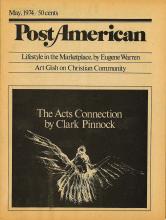Blessed are those who buy and sell. For theirs shall be the brand of their choice.
This “beatitude” is basic to American capitalism. The argument is that the consumer is king, ruling through free choice among available products, “voting” for the toothpaste or yacht of one’s choice. A slogan that summarizes this marketplace Darwinism is “the survival of the fittest product.” Defenses of the “free” market, as in William H. Peterson’s pamphlet, The Private Sector and the Public Sector, derive much of their appeal from insisting that the consumer’s choices determine which corporations survive and which go under. Lockheed, ITT, and other corporations seem to have found other ways to survive under free enterprise with the present administration.
Anyway, the “free” market model is simplistic, if not mythological. I accepted it for several years; from my reading in Christian Economics, National Review, and The Freeman, I don’t recall a frank discussion of the role played by advertising (among other factors) in determining what products consumers “vote” for. Regarding many products, I’d say I have no more satisfying choices than are usually offered in American elections.
An ironic sidelight is that many who hold to the free market model also espouse some conservative sort of Christianity. These people would violently reject biological Darwinism as atheistic, but gullibly accept economic Darwinism as “Christian economics”!
In this article I want to offer some observations on how American lifestyles are affected by the American marketplace, especially by advertising.
Read the Full Article

